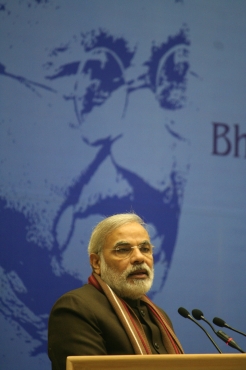 | « Back to article | Print this article |
Narendra Modi defines secularism at PBD meet
 "A lot of people in this country have given different definitions of secularism. I too have a right to give my own definition," Gujarat Chief Minister Narendra Modi said at a session of the Pravasi Bharatiya Divas in Delhi on Sunday, while replying to a query by New Yorker Sanjay Sinha.
"A lot of people in this country have given different definitions of secularism. I too have a right to give my own definition," Gujarat Chief Minister Narendra Modi said at a session of the Pravasi Bharatiya Divas in Delhi on Sunday, while replying to a query by New Yorker Sanjay Sinha.
"For me the definition of secularism is very simple: India first. That's it," Modi said, getting a huge round of applause from the NRIs, mostly Gujaratis, while addressing the state session at the 9th edition of the PBD that ended on Sunday.
The Gujarat CM was in a pretty laudatory mood when it came to his style of governance but was at his acerbic best while rebuking the media for ignoring the good work that the state is doing and highlighting negative issues.
"I'm very happy that you asked me this question," he told Sinha while replying to his query seeking the CM's thoughts on secularism.
"The media people want some masala (sensation) and I think they will get it now. Till now they were sleeping (while he spoke about various good governance schemes started by his state). Now, see how they have woken up from their sleep," he said leading to a round of applause and laughter from the assembled NRIs.
Earlier, in his address, he said that Gujarat has focused its attention on good governance. It was because of good governance, Modi said, that Gujarat has managed to steal the development march over other states despite the destructive earthquake that struck Bhuj on January 26, 2001.
"The real test of good governance is its grievance redressal system," he said. "That should be at the root any democratic system that people should not only be able to voice their problems freely but also get their problems solved quickly."
Praising his administration, he charted out three initiatives that has led to a sharp decrease in pendency of legal cases in various Gujarat court.
"Before starting this initiative, Gujarat had a pendency of 45 lakh (4.5 million cases). Had we let that continue, by now it would have ballooned to 1.5 crore cases. But because of the efforts of the state government and judiciary it has now come down to 18 lakh cases (1.8 million). We are running 100 evening courts and the entire judiciary too is working for extra hours," he said.
To solve the legal issues of the people of Gujarat his government took three initiatives, he said.
"One, we requested our courts to increase their working hours by 30 minutes to which they agreed. Secondly, we asked them if our courts could reduce the duration of their vacation by a week; that too was accepted happily.
"The third thing was our courts' infrastructure would lie idle after 5 pm. In a poor nation like ours, idling of such infrastructure is a huge waste of resources. So we started evening court sessions from 6 pm to 10 pm where people who work through the day but still have to appear before various courts for their cases could easily appear after completing their office hours. Thus poor people in Gujarat earn their livelihood in the daytime and appear in the court in the evening," he said.
Image: Narendra Modi | Photograph: Uttam Ghosh/Rediff.com